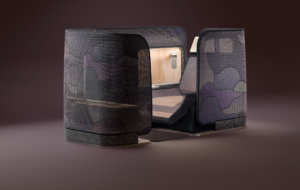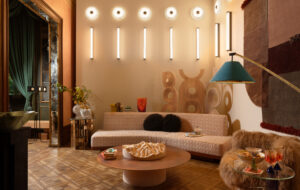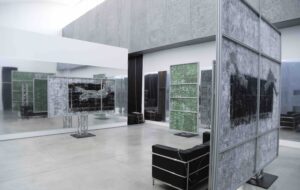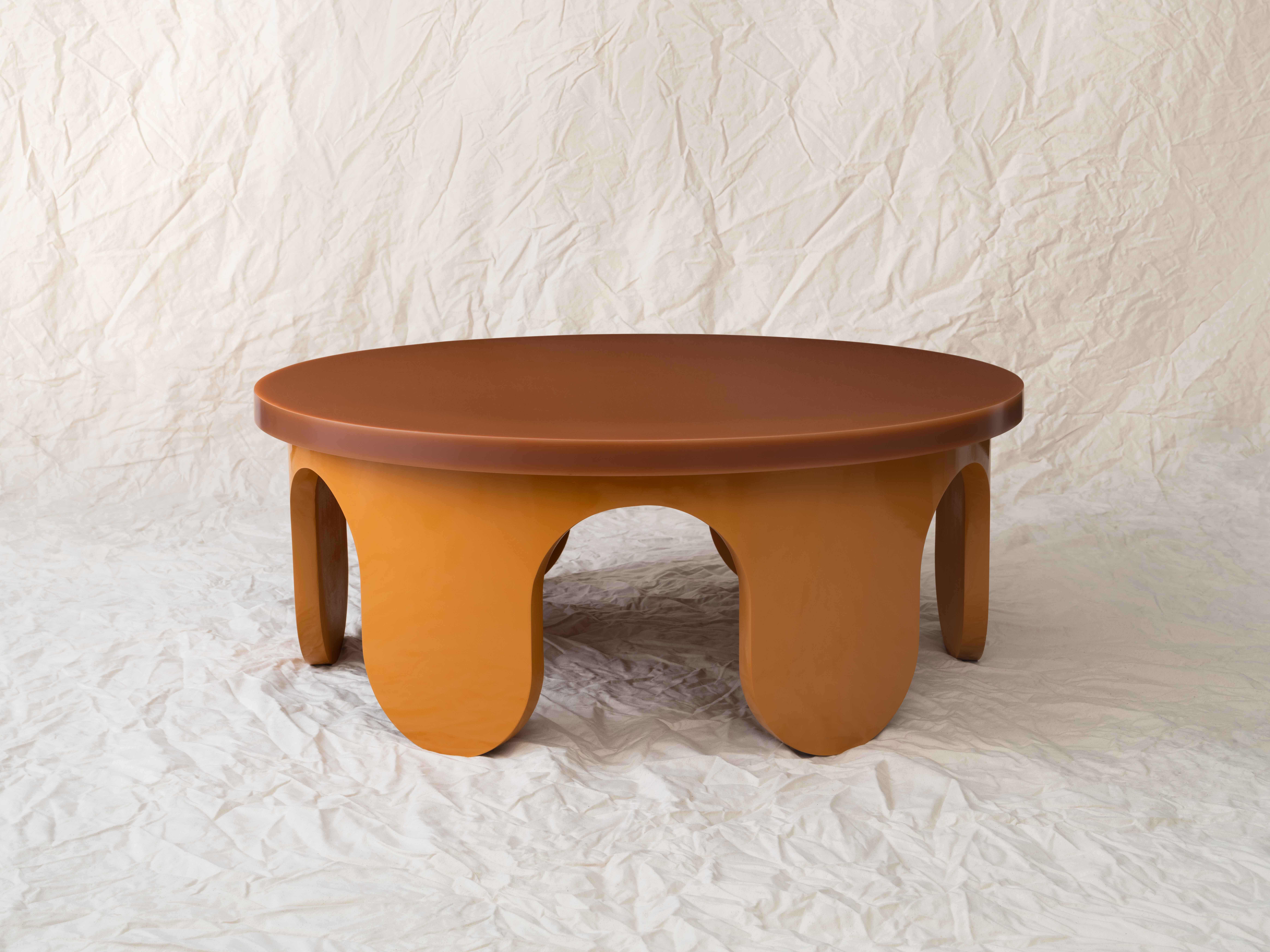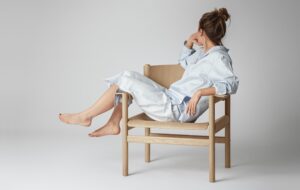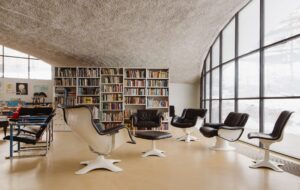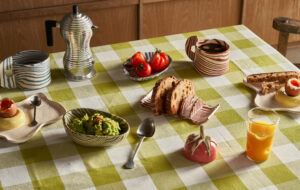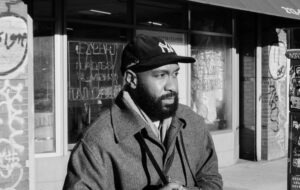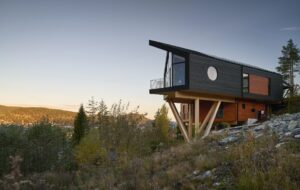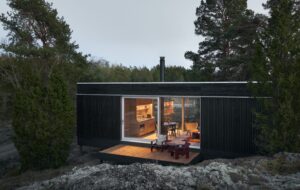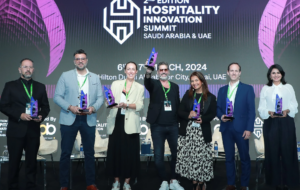

words Marcus Fairs
If Prada Tokyo and Selfridges Birmingham define store design in 2003, then 2004 will be all about a plain, 6,500sq m shed next to the giant Metro Centre shopping mall outside Gateshead. This is the unlikely location of the first Marks & Spencer Lifestore – a next-generation home-furnishings shop conceived by former Selfridges chief executive Vittorio Radice. To make things even more interesting, Radice has brought in Wallpaper* magazine founder and former editor Tyler Brule; to produce the store’s catalogue, advertising and printed matter.
Icon met up with them both at M&S headquarters on Baker Street, Central London to discuss their plans for the store and to hear why the magpie emporium is the next big thing in retailing.
When does the first Lifestore open?
VR The store opens in February but the catalogue, which Tyler is doing, should come out in January.
Tell us about the store.
VR The building is one of those out-of-town stores. There’s a nice car-park in front, but basically it’s an out-of-town factory. I can’t remember the store next door; I think it’s Asda. It’s adjacent to the Metro Centre. Have you been to the Metro Centre? It’s a big shopping centre like Brent Cross [North London].
People may be surprised to hear that it’s an out-of-town store. That’s a model many people are trying to move away from.
VR Why? I don’t know about this idea of driving being anti-architecture; it’s one of the dogmas. I think it’s very difficult to go against the wind. People like to use cars so let them use cars.
TB They can always look at the catalogue instead.
Did you select Gateshead for any particular reason?
VR No, that’s just how it turned out. We are
just lucky that Gateshead is a happening place right now.
Out-of-town shopping centres can be pretty soul-destroying. How will you make going to the Lifestore different?
VR Why do you think it’s a soul-destroying experience going shopping? Let’s make it not boring. The way you design the car-park, the sense of arrival in the store, the messages you are bombarded with, the music, the smile of the shop assistant, the way the merchandise is displayed. You’ve got so many tools to use to make that journey a wonderful one. Most people don’t use those tools.
Vittorio, at Selfridges you commissioned architects with very distinctive and flamboyant styles, such as Future Systems and Ron Arad. Why did you choose John Pawson – who’s the ultimate minimalist – for the Lifestyle store?
VR Think about eclecticism. Think about a big 6,500sq m factory lookalike out of town. Think about goods from different provenance, possibly food as well. Who can give you the cleanest background of all? The purest, most simple background but which is able to create space – space that talks. Who would you go to?
How did you two meet?
TB I was working for Dow Jones’ European business news. We did a story on what was happening at Habitat where Vittorio was commander-in-chief, and he was a guest on the show. Latterly, I launched Wallpaper*, so I went and knocked on his door for advertising money.
VR And we never did give you any!
TB Vittorio is a really great sparring partner because he’s always travelling and looking at things; always coming back with a book or a piece of fabric he’s picked up on his travels.
What are the new directions in retailing, and how will the Lifestore reflect that?
VR People aren’t looking for home furnishings, just as they are not looking for clothes and food: they want to buy ideas. They want to buy rocket salad mixed in with curry – that’s a new dish that mixes the Indian subcontinent with Apennine Italy. Those are the things people are looking for – the ability to mix this plus that plus that to create your own personal life. There is no particular style you need to be associated with – it’s a mixture.
TB It’s very interesting; you can still go to Verona, or Bergamo or lots of small, northern Italian towns and find the most amazing clothing retailers where they get the mix absolutely spot on. Which you don’t see here. Someone is selling fashion and they’ve got a bit of this brand and a bit of that and you go four doors further down and someone’s doing the same thing with home furnishings. They’re putting together a comprehensive mix.
And you get this evolution. It’s great to go back to Como every three months because the shops are always moving on.
VR There’s a shop called Biffi in Corso Genoa in Milan, which is one lady and her husband. To me, her eye… they’ve put together this plus this plus this, and created a look that is unique to that shop. It’s amazing.
TB What the customer also expects is a level of consistency. When you go to Biffi in Milan you always know you’re going to walk out having bought something. So the range is always moving, but it’s very consistent.
VR Everybody is looking for their own style. How do we as Marks & Spencer recognise that everybody is looking for their personal style and give them something – ideas – that change every month like a magazine? That is why eclecticism, which says that everything goes, is the way to do it, because you can change it more frequently.
TB The notion of ecleticism, to be able to pinball through the space, and actually be surprised at every turn, is very important. People travel much more now, so you can’t underestimate the consumer any more. They’ve been to Barcelona, they’ve been to Vienna, they’ve seen it all. There’s been a democratisation of travel, and a democratisation of design.
You both travel constantly. How does UK retailing compare with what you see abroad?
TB The one thing that is bad right now in the UK is the vertical integration of a lot of companies. There is very little surprise. This country created the butcher, the baker, the candlestick maker, but I think a lot of that has been eroded. We’ve had a collapse of the independent retailer, and that notion of the mix has gone.
VR And how do we make a very big retailer look like a small, independent one? That’s the key. One thing you can do is change it much more frequently. So if you’re coming in today you don’t feel you’ve bought something that 300,000 people already have. You go into some retailers and they have a bookcase they’ve had in the range for 25 years. You think, my God, has the whole country got the same bookcase?
TB They do.
VR They do!
What are the most interesting places you’ve been recently?
VR Athens is fantastic right now. Because of the Olympics next year. I don’t know about design, but as far as life is concerned it’s amazing. You should take a Saturday night trip to Athens. Very hot – go out at midnight and be back at 6am. I went two weekends, one after the other, because it was so good.
TB Where did you stay?
VR There’s only one place to stay – the Hilton. It’s fantastic – 36 floors, terrace overlooking the Parthenon and the sea. Wonderful. It’s just been restored. Not a fantastic building, but it’s the idea.
TB I’m fascinated with Portugal at the moment, and the Portuguese commonwealth. Mozambique and Angola are the interesting places right now. Suddenly you’ve got everybody buying up land in Maputo. Every hotel group has a major project in Mozambique.
VR Maputo as a destination? I never heard of it!
Is this a genuine trend – or does it become fashionable because you say so?
TB It comes from a couple of different angles. It just happens that the people running the most interesting cafe in Cape Town are from Mozambique. The reference point for the cafe always tends to be Italy, but these people take in the idea of Lisbon, Maputo cafe culture, and put it in a totally modern context. So you see what’s going on, then you hear that somebody went on a holiday there, then you hear there are some property developers who have got five kilometres of beach and have commissioned some amazing architect from Oporto to build great beach cabins.
VR Wonderful; yeah, yeah, yeah, yeah.
TB These sort of things suggest that something’s going on. British Airways starts flying to Luanda in Angola. There’s something happening. I don’t think it’s a self-fulfilling prophecy – we put it in print, therefore it’s a trend. I think there are others that will do that, but…
VR You go around and you hear things and you say has this got legs or not? Can we use this? Can we be part of it?
We’ve spoken about trends you’ve spotted around the world and are bringing back to the UK, but what is happening here? If a trendspotter from Maputo came to the UK what would they notice?
VR Hold on a second. Those influences, those ideas you bring back, you could get them going to the bathroom right here as far as I am concerned. It is the distillation, the putting it together, that creates a new package. It is the example of the rocket salad and the curry. Unless somebody does it, serves it, that thing that nobody else thought of, it becomes your signature dish. That’s how chefs build their names.
TB Isn’t that also the very Britishness, the very Englishness? After all, this is a nation of magpies; it’s a country of explorers. Retail explorers. This country built incredible emporiums as department stores, and I think more than any other nation in the world, if you rewind a century and a half, these stores became palaces for people from India to come and shop in, and for rich people from Hungary to do all of their shopping once a year. So to me it’s very English, this idea of the mix.
So you’re just following an English tradition?
VR Well, eclecticism is English. You go to Camden Town and you see wonderful yellow boots, mini-skirts in summer – those are the ideas that people then see and say oh yes! Not necessarily the yellow boots, but it’s that ability to read the signs and create a new package.
How much does London interest you as a city? You both travel around the world but how important is London? People are saying that London is still the most creative city in the world – would you agree with that?
VR I would say so, yes. You can find a lot of ideas around the world and bring them back here and London accepts them. You have an audience that is much more willing to listen than anywhere else. In Italy, for example, you would have a tough time because Italy is much more conservative. You wear a Swatch watch and 53 million people wear it. And this year it’s the Swatch watch, next year it’s Silhouette sunglasses and that’s it. Nothing else works. In London, everything works.
TB I would agree. What you have right now – and it’s across all sectors, it doesn’t matter if you’re looking at media, photography, television – although that’s on a bit of a downward slide – broadcast – all incredible. Music, documentary and film-making. It is that idea that it’s a market where people come to buy and sell, and I don’t think that’s going to change any time soon.
VR It would be very difficult to launch a Wallpaper* in Rome, for example.
TB Absolutely. We couldn’t have done Wallpaper* in any other city in the world. No way.

